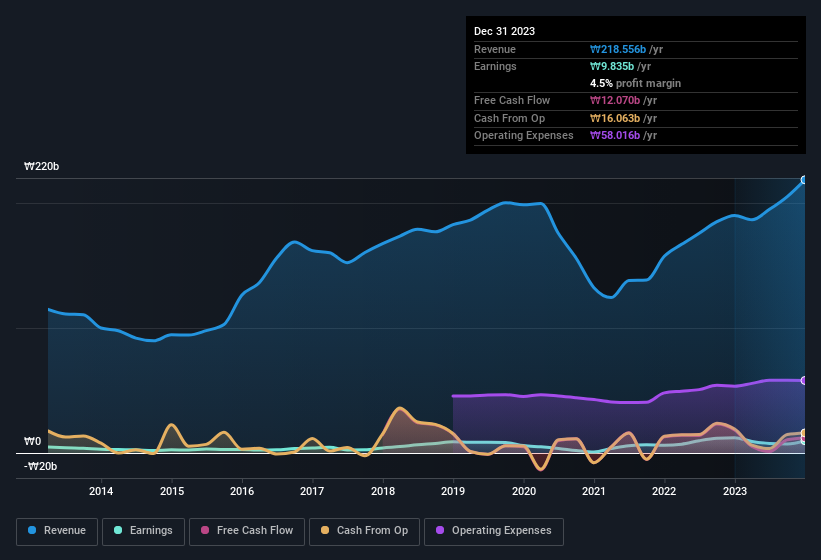- South Korea
- /
- Media
- /
- KOSDAQ:A010470
Some Investors May Be Willing To Look Past Oricom's (KOSDAQ:010470) Soft Earnings

The market for Oricom Inc.'s (KOSDAQ:010470) shares didn't move much after it posted weak earnings recently. We did some digging, and we believe the earnings are stronger than they seem.
See our latest analysis for Oricom

Examining Cashflow Against Oricom's Earnings
As finance nerds would already know, the accrual ratio from cashflow is a key measure for assessing how well a company's free cash flow (FCF) matches its profit. To get the accrual ratio we first subtract FCF from profit for a period, and then divide that number by the average operating assets for the period. You could think of the accrual ratio from cashflow as the 'non-FCF profit ratio'.
As a result, a negative accrual ratio is a positive for the company, and a positive accrual ratio is a negative. While it's not a problem to have a positive accrual ratio, indicating a certain level of non-cash profits, a high accrual ratio is arguably a bad thing, because it indicates paper profits are not matched by cash flow. Notably, there is some academic evidence that suggests that a high accrual ratio is a bad sign for near-term profits, generally speaking.
Over the twelve months to December 2023, Oricom recorded an accrual ratio of -0.13. That indicates that its free cash flow was a fair bit more than its statutory profit. In fact, it had free cash flow of ₩12b in the last year, which was a lot more than its statutory profit of ₩9.83b. Oricom's free cash flow actually declined over the last year, which is disappointing, like non-biodegradable balloons.
Note: we always recommend investors check balance sheet strength. Click here to be taken to our balance sheet analysis of Oricom.
Our Take On Oricom's Profit Performance
Oricom's accrual ratio is solid, and indicates strong free cash flow, as we discussed, above. Based on this observation, we consider it likely that Oricom's statutory profit actually understates its earnings potential! And on top of that, its earnings per share have grown at an extremely impressive rate over the last three years. The goal of this article has been to assess how well we can rely on the statutory earnings to reflect the company's potential, but there is plenty more to consider. With this in mind, we wouldn't consider investing in a stock unless we had a thorough understanding of the risks. Every company has risks, and we've spotted 3 warning signs for Oricom you should know about.
Today we've zoomed in on a single data point to better understand the nature of Oricom's profit. But there is always more to discover if you are capable of focussing your mind on minutiae. Some people consider a high return on equity to be a good sign of a quality business. While it might take a little research on your behalf, you may find this free collection of companies boasting high return on equity, or this list of stocks that insiders are buying to be useful.
New: AI Stock Screener & Alerts
Our new AI Stock Screener scans the market every day to uncover opportunities.
• Dividend Powerhouses (3%+ Yield)
• Undervalued Small Caps with Insider Buying
• High growth Tech and AI Companies
Or build your own from over 50 metrics.
Have feedback on this article? Concerned about the content? Get in touch with us directly. Alternatively, email editorial-team (at) simplywallst.com.
This article by Simply Wall St is general in nature. We provide commentary based on historical data and analyst forecasts only using an unbiased methodology and our articles are not intended to be financial advice. It does not constitute a recommendation to buy or sell any stock, and does not take account of your objectives, or your financial situation. We aim to bring you long-term focused analysis driven by fundamental data. Note that our analysis may not factor in the latest price-sensitive company announcements or qualitative material. Simply Wall St has no position in any stocks mentioned.
About KOSDAQ:A010470
Flawless balance sheet, good value and pays a dividend.
Market Insights
Community Narratives



